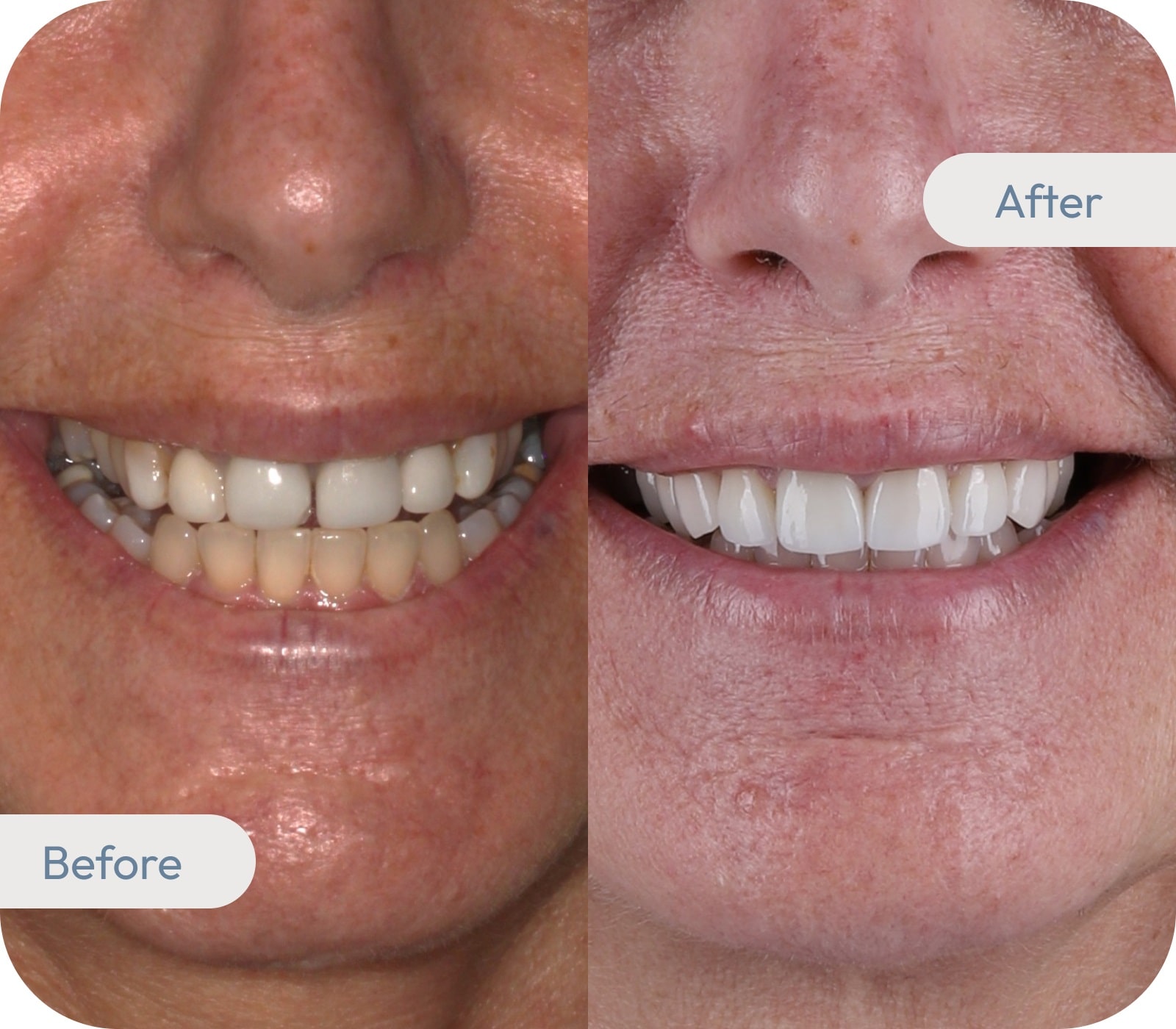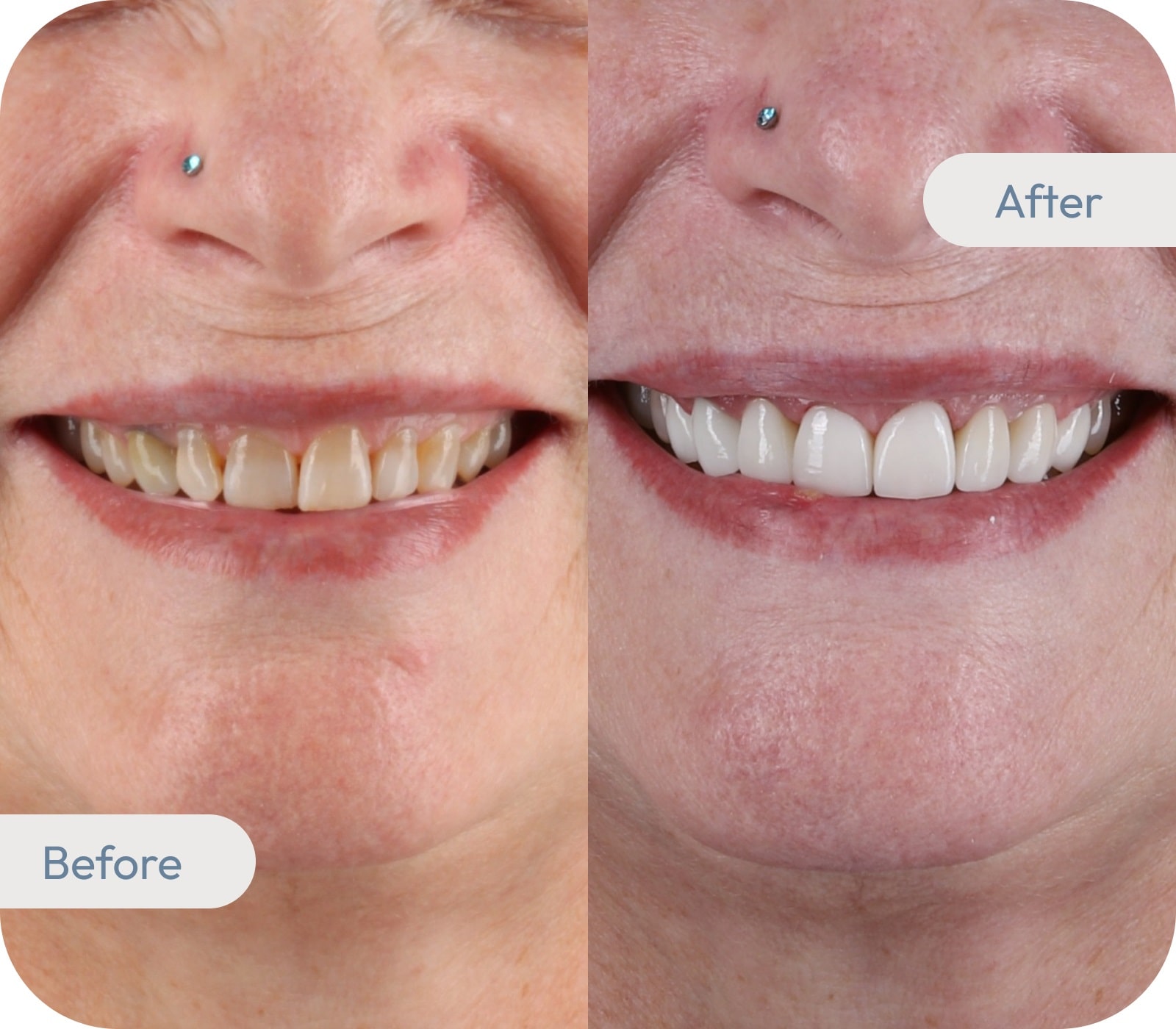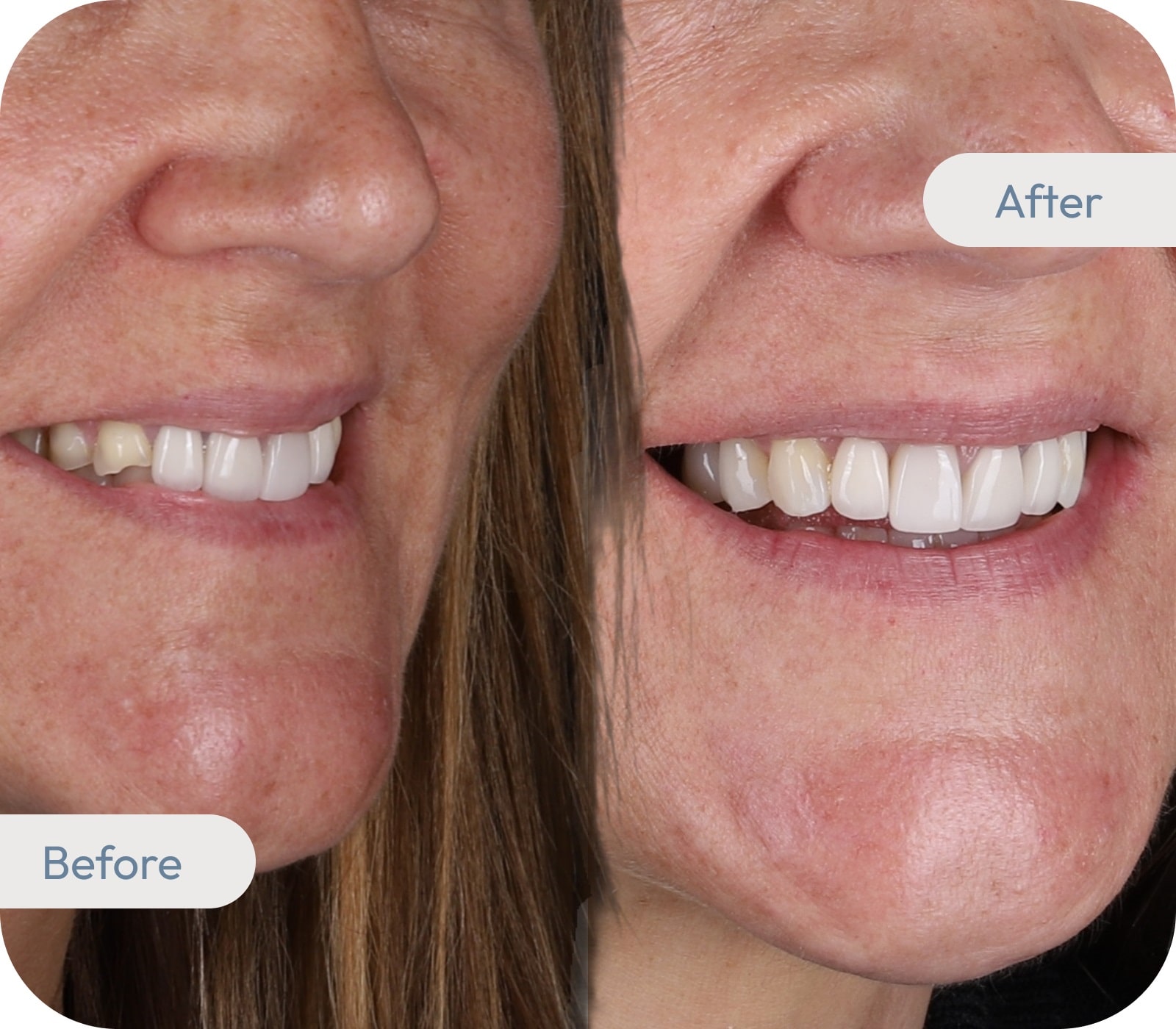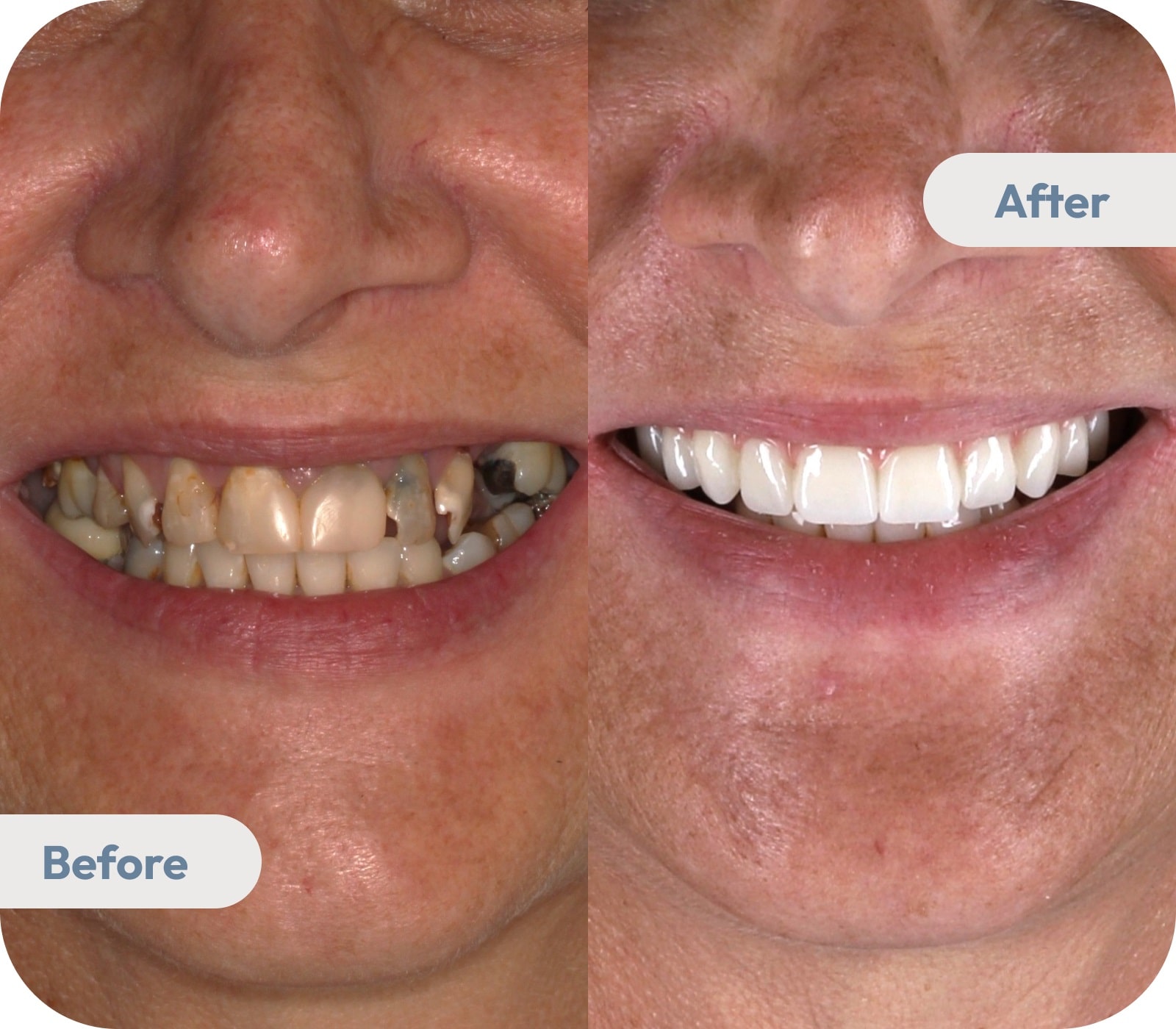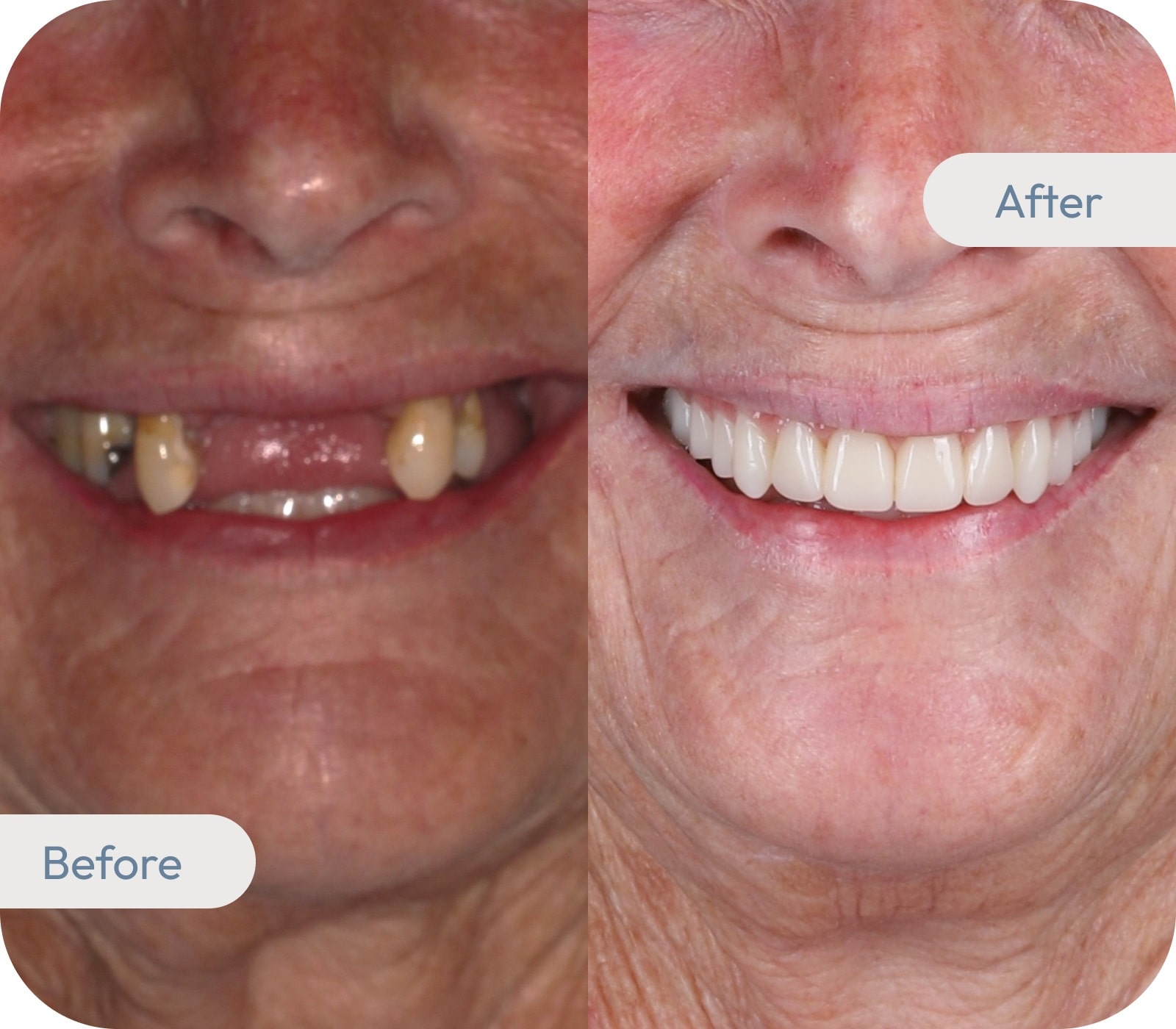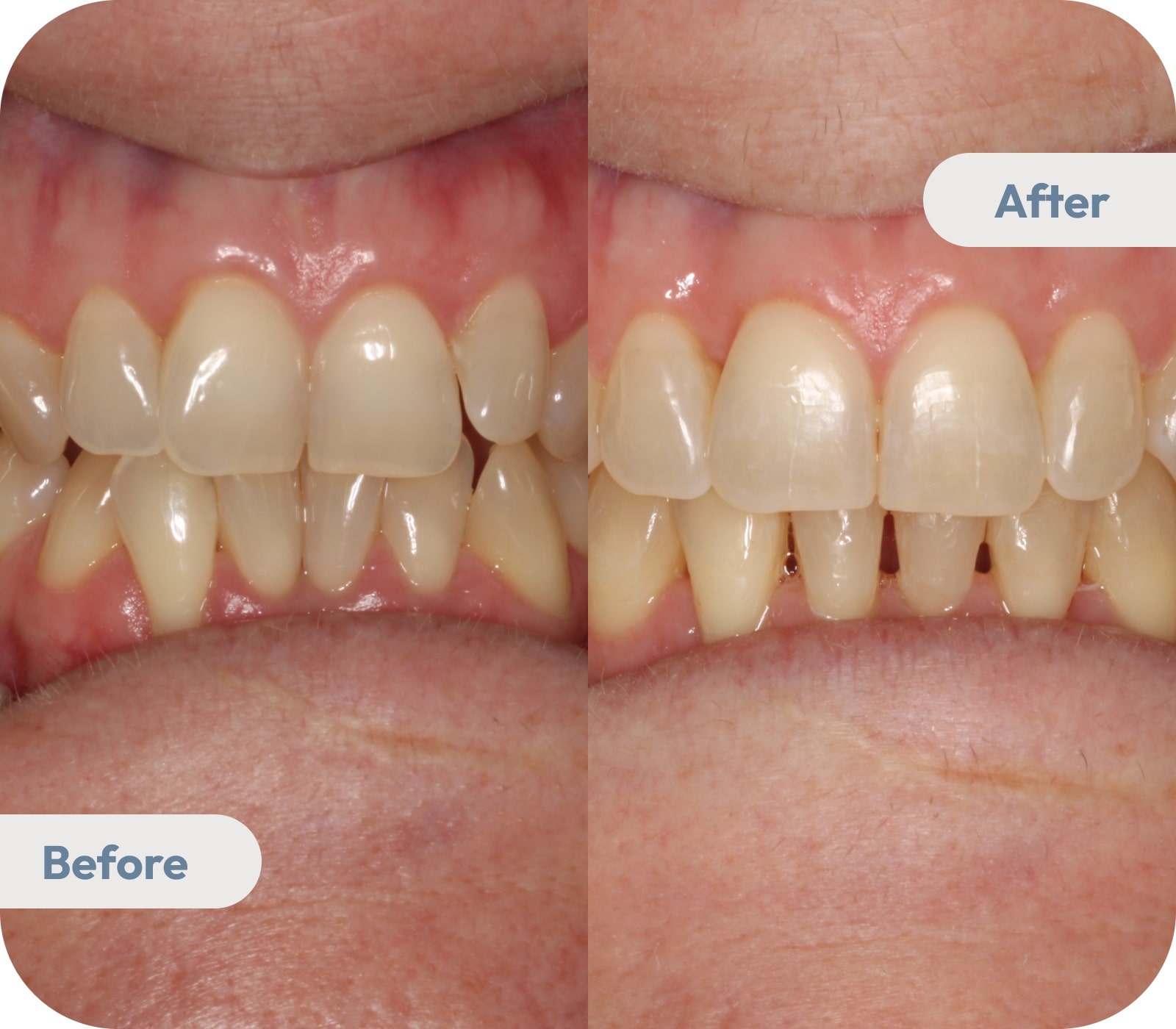Restore. Protect. Smile.
Custom Dental Crowns in Bunbury, Tailored to You
A damaged tooth doesn’t have to stay uncomfortable or limit your bite. Our dental crowns in Bunbury are custom-made to support weakened teeth and help restore function, comfort, and a natural appearance.
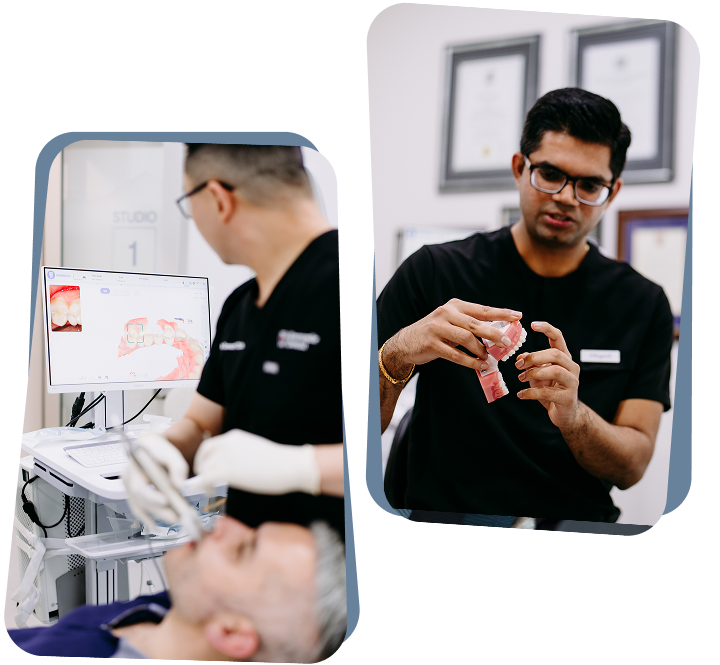
Restoring Damaged Teeth
With Dental Crowns
A dental crown is a protective cover placed over a damaged or weakened tooth. It restores the tooth’s shape, supports everyday function, and is designed to blend with nearby teeth. Crowns are often used for cracked, worn, or heavily filled teeth. At Eversmile Dental, we use digital scanning and custom design to create comfortable, durable restorations with appropriate care. Outcomes vary depending on individual needs.
When Do You Need a
Dental Crown?
- Cracked or Chipped ToothSmall cracks or chips can weaken the structure of your tooth. A crown can help protect the remaining tooth from breaking further and is designed to restore shape and support normal chewing.
- Large Filling or DecayIf a tooth has lost too much structure from decay or a large filling, it may be weakened. A dental crown adds support and may help protect the tooth from further damage during everyday use.
- Worn-down TeethGrinding, acid erosion, or age-related wear can cause teeth to become short, sensitive, or uneven. A dental crown helps rebuild lost height and function, which may improve comfort, bite alignment, and appearance, depending on individual needs.
- Post-root Canal TreatmentAfter a root canal, the tooth can become brittle over time. A crown helps protect the remaining tooth structure and can help reduce the risk of cracks or breakage, especially in back teeth used for chewing.
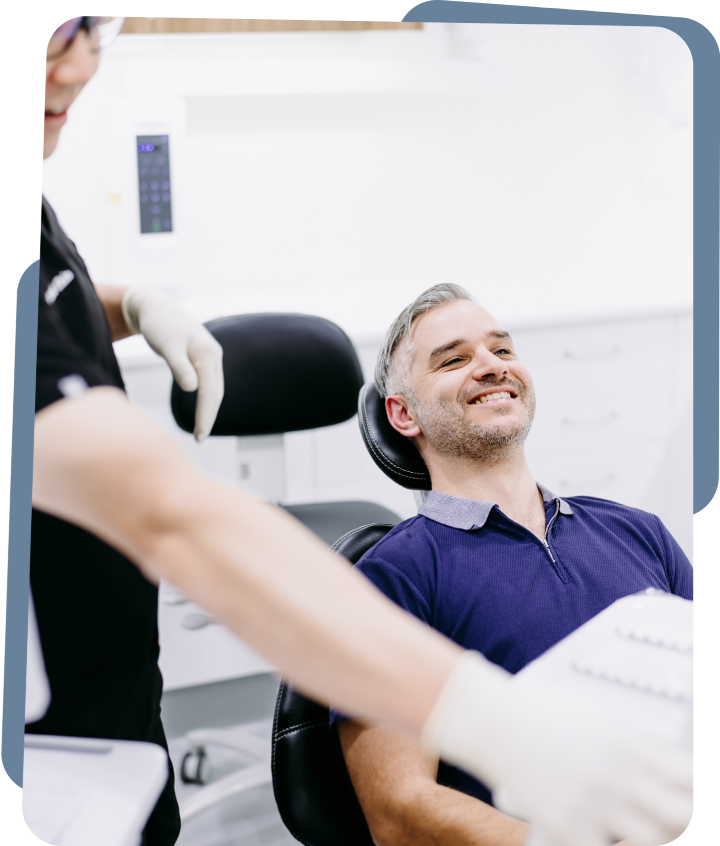

Explore the Functional and Cosmetic Benefits
of Dental Crowns
- Tooth ProtectionCrowns cover teeth that are cracked, decayed, or heavily filled. Enclosing the remaining structure may help prevent further breakage and reduce sensitivity. This is especially important for molars and post-root canal teeth.
- Improved FunctionA dental crown is designed to support normal biting and chewing, especially in back teeth that handle daily pressure. It helps stabilise your bite and may make eating more comfortable, depending on tooth condition.
- Natural AppearanceModern crowns are designed to blend in with nearby teeth. Dentists carefully match the colour and shape so the crown aims to restore a natural look without feeling bulky.
- Long-term DurabilityCrowns are made from durable materials like zirconia or porcelain fused with metal. Regular dental care and good oral hygiene can help crowns last for many years and support your overall oral health.
Considering a Dental Crown? Speak with Our Bunbury Dental Team
If you’re dealing with a damaged tooth, we’re here to help. Book a consultation in Bunbury to explore if a dental crown is the right option for your dental needs.

What to Expect: The Crown Procedure at Eversmile Dental
We begin by examining the tooth and surrounding gums to assess any damage, discomfort, or sensitivity. Your dentist will ask about symptoms and may take digital X-rays to evaluate the roots and supporting bone. This helps us determine whether a dental crown is the right option for you. We’ll then walk you through your treatment options and answer your questions in clear, simple language.
Once we confirm a crown is needed, the tooth is reshaped to create enough room for it. We then use a small intraoral scanner to capture detailed 3D images of your teeth, which usually avoids traditional impression trays. These digital scans are used to design a custom crown that suits your bite, is designed to blend with nearby teeth, and aims to feel comfortable in your mouth.
After preparing the tooth, we place a temporary crown to protect it while your custom-made crown is being created. This temporary crown is intended to allow you to eat, speak, and function as usual, though some sensitivity may occur. It may also help reduce sensitivity or irritation. We’ll give you easy care instructions until your final crown is ready, which will be fitted at your next appointment.
Your digital scans are sent to our in-house 3D printer, where your custom crown is designed and fabricated on-site. This technology can support precise fabrication and may shorten turnaround times. Each crown is shaped to match your bite and surrounding teeth. By creating it on-site, we can oversee quality control and may reduce the waiting time between appointments, helping make the process more convenient for many patients.
At your next visit, the temporary crown is gently removed. Your custom crown is then checked for fit, bite, and comfort. We assess how it feels when you bite down and make small adjustments if needed. Once the fit is confirmed, the crown is bonded securely to the tooth. Our goal is to provide a crown that blends naturally and supports normal function, though outcomes can vary depending on individual needs.
Smile Gallery – Before and After Treatment Examples
Explore real treatment outcomes in our gallery. These before-and-after photos show actual patients of Eversmile Dental, displayed with their consent. Outcomes vary between individuals, and results are not guaranteed. Images are unedited and taken under comparable conditions to reflect realistic treatment outcomes.
*These images display actual patients of our clinic. Every case is different, and treatment outcomes can vary according to individual conditions and needs.
Why Bunbury Turns to Us for Restoring Smiles
Restorative dentistry is about restoring and replacing teeth to maintain function, comfort, and oral health. At Eversmile Dental, we combine experience, empathy, and modern technology to deliver care that supports your long-term oral health.
-
- Local Care, Genuine Connection
- We’re more than a dental team—we’re your neighbours, your kids’ schoolmates, and your fellow locals. Living and working in Bunbury means we understand the pace of life here and the needs of the people we serve. Our care is personal because this is our community, too, and your well-being matters to us.
-
- Providing Restorative Dental Care in Bunbury Since 2006
- For nearly two decades, our team has been providing restorative dental treatments for the Bunbury community. We offer crowns, bridges, and dentures, using established dental techniques and technology. The dentists at Eversmile Dental draw on their extensive experience to guide their approach to restorative care.
-
- Restorative Treatments for Different Age Groups
- Restorative dentistry can be applicable at different stages of life, depending on individual oral health needs. From restoring damaged teeth to replacing missing ones, our team offers a range of treatment options. We also emphasise prevention and long-term care to assist patients in managing their oral health over time.
-
- Restorative Care Designed Around You
- We recognise that every patient’s needs are unique. Our team takes the time to listen carefully, explain available treatment options, and answer your questions. Together, we develop a plan that reflects your oral health needs, personal preferences, and budget. Our goal is to help you make treatment decisions that are clear and well-informed.
-
- Professional Standards in Restorative Dentistry
- Our restorative care is based on current dental standards and supported by clinical evidence. We explain the purpose of each recommended option, allowing you to make informed choices about your treatment. Our focus is on delivering appropriate care in line with recognised professional guidelines.
-
- Incorporating Modern Technology into Patient Care
- Our clinic incorporates technology such as digital scans, CBCT imaging, and in-house 3D printing into patient care. We use these tools to assist in the planning and delivery of restorative treatments, including crowns, bridges, and implants. They are integrated into the way we provide restorative dentistry at Eversmile Dental.
Frequently Asked Questions
Explore commonly discussed topics about dental crowns, including procedure steps, materials, care tips, and what to expect before, during, and after treatment.
How long do dental crowns last?
Dental crowns can last for many years. Studies suggest an average lifespan of around 10–15 years, though this varies depending on the material, oral hygiene, and individual habits.
Here’s a general guide by material:
- Zirconia crowns typically last between 5 and 15 years, depending on the ceramic quality and bite pressure.
- Porcelain crowns may last 10 to 15 years and are often chosen for their tooth-like appearance.
- Full metal crowns often last between 3 and 15 years and are often used for their strength, especially for back teeth.
- Porcelain-fused-to-metal crowns generally last 8 years or more, combining strength with a tooth-coloured appearance.
Several key factors influence how long your crown will last.
- Material type: Different crown materials have different strengths. Full metal crowns often last longer under pressure. Porcelain looks natural but may chip if overloaded.
- Location in the mouth: Molars bear more chewing force than front teeth. Crowns on back teeth may wear faster than those on incisors or canines.
- Oral hygiene habits: Daily brushing, flossing, and regular check-ups help prevent decay at the crown’s edge and reduce the risk of gum disease underneath.
- Teeth grinding or clenching (bruxism): Grinding places extra force on crowns. Such habits can lead to cracking or faster wear. Nightguards may be recommended in these cases.
- Diet and chewing habits: Chewing on ice, pens, or hard foods can damage a crown. Sticky or very hard items increase the chance of loosening or fracturing.
- Gum health and underlying tooth structure: If gums recede or the natural tooth weakens, a crown may eventually need replacement. Healthy gums help support a stable restoration.
- Dental care and maintenance: Regular visits allow your dentist to monitor the crown’s condition. Early intervention helps address small issues before they become major problems.
Results and longevity vary between individuals. At Eversmile Dental in Bunbury, we guide you on how to care for your crown in the long term. We also assess individual risk factors before treatment.
Is getting a dental crown painful?
Getting a dental crown is usually not painful. The procedure is done under local anaesthetic, so most people don’t feel pain during the treatment. Instead, it’s more common to experience a sensation of pressure or mild discomfort.
After the appointment, it’s normal to feel some sensitivity or tenderness around the affected tooth. This typically lasts for a few days and can be managed with over-the-counter pain relief. If discomfort continues, your dentist may adjust the crown or check your bite.
Some patients feel nervous before treatment, especially if they’ve had a sensitive experience in the past. At Eversmile Dental, we take time to walk you through every step. We may use gentle techniques or, where appropriate, sedation options to support patients who feel anxious.
For patients needing a tooth crown in Bunbury, our goal is to support comfort throughout the process. Your dentist will confirm that the area is fully numb before beginning and will check in with you throughout the procedure.
How much does a dental crown cost?
At Eversmile Dental, the starting price for a dental crown is $1,660. However, the total fee depends on several individual factors. The figures below are common estimates and may vary based on personal circumstances.
Estimated fees by crown type:
- Ceramic crowns are usually priced between $1,740 and $2,150. These crowns provide a tooth-coloured finish and are commonly used for visible teeth.
- Full metal crowns range from $2,025 to $2,575 and are commonly used when additional strength is needed, particularly on back teeth.
- Porcelain-fused-to-metal crowns are commonly priced between $1,700 and $2,105. This option combines tooth-coloured porcelain with a metal foundation for added durability.
These amounts are provided as a general guide only. A personalised quote is given after a clinical assessment.
Several factors may affect the final cost of a dental crown. These include the following:
- Material selected: Different materials have different costs. Zirconia, porcelain, and metal vary in strength, appearance, and manufacturing process.
- Tooth position: Molars may require stronger materials or more shaping. This can increase the time and cost involved.
- Condition of the tooth: If a tooth is heavily worn or broken down, extra steps may be needed to prepare it for a crown.
- Additional procedures: A post, core build-up, or digital scan may be required. These are itemised separately and may increase the overall cost.
- Technology and lab methods: Some crowns are made using digital scanning and design systems. The lab method used can influence the final fee.
- Health fund arrangements: Your out-of-pocket cost may vary depending on the agreement between your provider and the health fund.
Crowns play a role in many forms of dental restoration that Bunbury patients may consider, especially when a tooth is weakened or structurally compromised. Your dentist will assess whether this option is suitable for your individual needs.
Do crowns cost more than implants or bridges?
Dental crowns often involve lower costs than implants and may cost less than bridges, depending on the case. However, each option serves a different purpose and involves different procedures.
- Crowns are used to cover and protect a single damaged tooth. At Eversmile Dental, crowns start at $1,660, with the final cost depending on individual circumstances. They are usually placed on an existing tooth that has been prepared.
- Implants replace a missing tooth entirely. This involves placing a titanium post in the jawbone, followed by a crown on top. Implants typically involve higher costs because they require surgical placement and several visits.
- Bridges replace one or more missing teeth by using neighbouring teeth as anchors. The cost of a bridge can be similar to or more than a crown, depending on the number of teeth being replaced.
While crowns are used to support and restore existing teeth, implants and bridges are used when teeth are missing. Your dentist will explain which option suits your situation after assessing your oral health and goals.
Do private health funds cover crowns?
In some cases, out-of-pocket costs may be reduced through private health fund arrangements. Your policy and the agreement between your provider and the fund determine your claim amount.
In some cases, out-of-pocket costs may be reduced through private health fund arrangements. Your policy and the agreement between your provider and the fund determine your claim amount.
Written quotes are provided during your consultation to clarify costs before proceeding with any dental work.
Are dental crowns worth the cost?
Dental crowns play an important role in restoring both function and appearance to a damaged tooth. For many people, they offer a durable way to protect a tooth that might otherwise break or wear down further.
A crown may improve chewing comfort, help prevent further damage, and enhance the shape or colour of a tooth. It also allows you to retain the natural tooth structure underneath rather than having it removed.
While the upfront cost of a crown can seem high, it is typically a longer-term treatment that can support dental stability. This may reduce the need for more complex work in the future.
At Eversmile Dental, we discuss the benefits and limitations of every option so you can decide what suits your situation, priorities, and budget.
What are the different types of crowns?
There are several types of crowns, each suited to different teeth, goals, and situations. The material used can affect the crown’s appearance, strength, and cost.
- Ceramic crowns: These are made from tooth-coloured materials and are often used on front teeth. They are designed to blend with nearby teeth and provide a tooth-coloured appearance.
- Porcelain-fused-to-metal crowns: These crowns combine porcelain for appearance with a metal base for strength. They may be used when extra support is needed.
- Full metal crowns: Made from gold alloy or other metals, these crowns are sturdy. They are often used on back teeth where bite pressure is high.
- Zirconia crowns: Zirconia is a strong ceramic material that is suitable for both front and back teeth. It is commonly used for durability and a tooth-coloured appearance.
- Temporary crowns: These are placed for short-term use while the final crown is being made. They protect the tooth and help maintain function during the waiting period.
At Eversmile Dental, your dentist will help you choose the right type of tooth crown in Bunbury based on your goals, tooth condition, and where the crown needs to be placed.
What’s the difference between a crown, a cap, and a veneer?
These terms describe different types of dental restorations. Here’s a quick breakdown:
Crown (or dental cap): A crown covers the entire visible part of a tooth. It is used when a tooth is significantly weakened or damaged.
Dental cap: This is simply another name for a crown. The word “cap” is often used informally to describe the same restoration.
Veneer: A veneer is a thin layer of material bonded to the front of a tooth. It is usually chosen for cosmetic purposes, like improving shape or colour; it is not meant to provide structural strength.
The right choice depends on your tooth’s condition and what aspects need to be restored—function, appearance, or both.
Can crowns be replaced, and how many times can they be replaced?
Yes, crowns can be replaced. The number of times a crown can be replaced depends on the condition of the remaining tooth and gum tissue.
A crown may need replacing if it no longer fits well or shows signs of wear.
As long as the underlying tooth remains stable and there is no extensive damage, a new crown can be placed.
If the tooth is compromised due to decay or loss of structure, replacement may be more complex and involve additional procedures or may not be possible.
Dentists assess the tooth and the surrounding area to determine whether a new crown can be placed.
Each case is different. Your dental history, hygiene, and bite pressure all influence how often a crown may need to be replaced.
How do I know when my crown needs to be replaced?
If you experience changes in comfort, function, or appearance, it may be time to have your crown reviewed. Here are common signs to look out for:
Pain or sensitivity: If biting or chewing becomes uncomfortable, your crown may no longer fit properly.
Visible wear or damage: Chips, cracks, or thinning edges can reduce function and expose the underlying tooth.
Loose crown: Movement or shifting can trap food and cause gum irritation or decay.
Gum changes: Receding gums around a crown may expose vulnerable areas and increase the risk of decay.
- Appearance changes: If the crown no longer blends in with nearby teeth, you may choose to discuss replacement for aesthetic reasons with your dentist.
If you had a crown placed to restore a cracked tooth, regular check-ups can help detect early signs of change, even before symptoms start.
Do I need a crown after a root canal treatment?
A crown may be recommended after a root canal, especially on back teeth. This can help protect the tooth from cracking and restore normal chewing strength.
Molar or premolar teeth take on a heavy bite force. A crown can help reduce the chance of future damage.
Heavily restored or worn teeth may require added support to prevent further breakdown.
Teeth that have had root canal treatment have less tooth structure. In some cases, a crown may be recommended to support the tooth and reduce the risk of cracks.
Protecting the tooth for regular function may help prevent problems later.
Front teeth that are still structurally sound may not always need a crown. Your dentist will assess your case and recommend what suits your individual needs.
In Bunbury, dental crowns are sometimes used after a root canal to help restore strength and support the remaining tooth structure.
Various Payment Options Available
Eversmile Dental offers a range of flexible payment options to assist patients in managing the cost of their dental care. Please ask our team for details about the payment plans available.
Book Your Appointment Online or Call Our Bunbury Dental Clinic
Book an appointment with our dentist in Bunbury to discuss your oral health needs. We provide tailored dental treatments and clear information to support informed decisions about your dental care.
